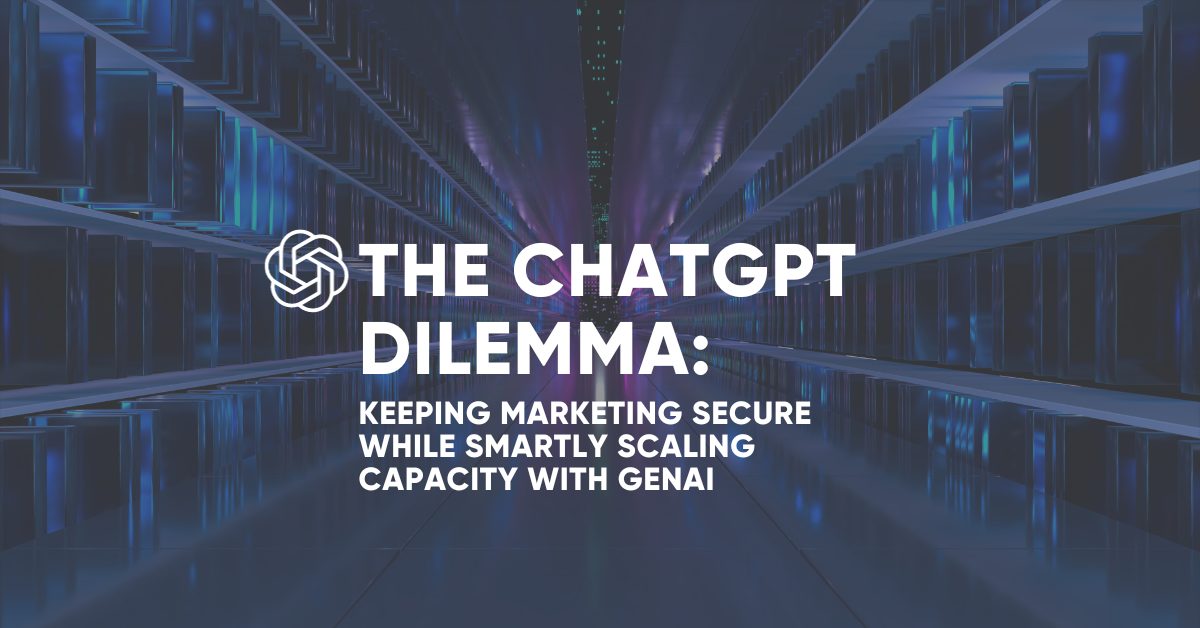The Marketing world changed in late 2022 with the public launch of ChatGPT, quickly followed by Bard. Marketers across industries flocked to Generative AI as a way to enhance creativity, accelerate projects, and make smarter decisions. It is not an exaggeration to say that the advent of AI and chatbots has revolutionized the way businesses engage with their customers.
ChatGPT, powered by OpenAI, and Bard, powered by Google, have become valuable tools for marketing teams. However, their adoption comes with its own set of security risks that are important to understand. Many companies, universities, and other organizations have already forbid the use of generative AI tools for security reasons, but is AI for Marketers worth the risk?
Let’s explore the potential threats and discuss how marketing teams can make a compelling argument to retain access to ChatGPT and/or Bard despite these risks. We’ll also explore strategies to mitigate these security concerns effectively.
Understanding the Security Risks
Marketers have a reputation, perhaps well-deserved, for ignoring business risks in favor of creativity and effectiveness. So before making a case for retaining access to ChatGPT or other powerful GenAI tools, it’s crucial to acknowledge the security risks associated with them:
Data Privacy Concerns:
ChatGPT processes large volumes of data, often including sensitive customer information. While OpenAI has implemented stringent data security measures, there’s always a risk of data breaches. Unauthorized access to this data can lead to privacy violations and legal consequences.
Content Quality and Brand Image:
ChatGPT generates text based on the input it receives, and not everything in that input may be recent, reliable, or well-written. Sometimes ChatGPT may produce content that is inconsistent with a brand’s values or quality standards. If such content is released without proper oversight, it can harm a company’s reputation and erode customer trust.
AI Hallucinations
Beyond the quality of the content is the accuracy of the content. Gen AI has brought forth a fascinating and somewhat bewildering phenomenon known as “hallucination.” In layman’s terms, you might say it is “Just making stuff up.” Unlike the optical illusions we often associate with the term, in the AI context, hallucination refers to the capacity of next-generation AI models to generate incredibly convincing yet entirely fabricated content. It’s as if these machines possess the power to craft intricate and detailed mirages, making us question what’s real and what’s not.
Phishing and Misuse:
There’s a risk that ChatGPT could be used for malicious purposes, such as crafting convincing phishing messages or creating harmful content. This not only poses a risk to the public but could also result in regulatory action against the company that deploys ChatGPT.
Intellectual Property and Copyright Violations:
ChatGPT may generate text that inadvertently infringes on intellectual property rights or violates copyrights. This can lead to legal challenges and financial repercussions.
Dependency and Reliability:
Over-reliance on ChatGPT can pose a risk to marketing teams. If the system encounters issues or experiences downtime, it can disrupt marketing operations, affecting customer service, content generation, and more.
Mitigating the Security Risks
Now that we’ve identified the potential risks, let’s explore some strategies that marketing teams can adopt to mitigate these concerns while still reaping the benefits of ChatGPT:
Robust Access Control and Monitoring:
To address data privacy concerns and misuse, marketing teams should implement stringent access control measures. Only authorized personnel should have access to ChatGPT, and each access request should be logged and monitored. These logs can be reviewed to detect any suspicious activity or data breaches. Regular security audits and penetration testing can also help identify vulnerabilities and strengthen the system’s security.
Content Moderation and Review:
To maintain the quality of generated content and protect the brand image, marketing teams should establish a clear content moderation and review process. This can involve a combination of AI and human oversight. AI tools can be used to pre-screen generated content for potential issues, followed by human reviewers who can make necessary adjustments to ensure compliance with brand standards. Additionally, businesses can invest in developing custom models that are fine-tuned to align with their specific brand guidelines.
Ethical AI Use Policies and Training:
To prevent ChatGPT from being used for malicious purposes, marketing teams should implement clear and comprehensive ethical AI use policies. These policies should outline acceptable and unacceptable use cases, as well as the potential consequences of misuse. Moreover, regular training and awareness programs for employees can help ensure that everyone understands the ethical boundaries and implications of using AI in marketing. This proactive approach can reduce the chances of misuse while empowering employees to make responsible decisions.
Legal Compliance and Documentation:
To mitigate legal risks like copyright violations and intellectual property issues, marketing teams should maintain detailed records of content generated by ChatGPT. These records should include timestamps, input data, and generated text. Having this documentation readily available can assist in addressing copyright claims and establishing that content was generated using AI tools. Additionally, consulting legal experts to understand potential liabilities and compliance issues is essential.
Redundancy and Contingency Plans:
To address concerns related to system dependency and reliability, marketing teams should develop contingency plans. This includes having backup resources or alternative solutions in place for critical functions. Additionally, teams should communicate transparently with their customers about the use of AI in their operations and what measures are in place to ensure a seamless customer experience, even in the event of AI system disruptions.
Making the Argument for ChatGPT
Having explored these strategies for mitigating security risks, marketing teams can now build a compelling argument for retaining access to ChatGPT:
Enhanced Customer Engagement:
ChatGPT’s capabilities enable marketing teams to engage with customers in real-time, offering personalized recommendations and solutions. This can significantly enhance customer satisfaction and loyalty, leading to increased sales and long-term growth.
Efficiency and Cost Savings:
ChatGPT automates repetitive tasks, reducing the workload on human employees and allowing them to focus on more strategic and creative aspects of marketing. This not only enhances efficiency but also leads to cost savings in the long run.
Competitive Advantage:
As AI becomes increasingly prevalent in marketing, companies that leverage tools like ChatGPT gain a competitive edge. They can deliver superior customer experiences, generate content more efficiently, and respond to market changes with agility.
Data-Driven Insights:
AI models can process vast amounts of customer data, providing marketing teams with valuable insights into customer behavior and preferences. These insights can inform better decision-making and lead to more effective marketing strategies.
Mitigation Measures:
Marketing teams can highlight the robust security measures and policies in place to mitigate risks associated with ChatGPT. Emphasizing their commitment to data privacy, ethical use, and legal compliance will assure stakeholders that they are taking these concerns seriously.
The security risks associated with ChatGPT, Bard, and other GenAI tools are real, but with proper mitigation strategies and a compelling argument, marketing teams can make a strong case for retaining access to these valuable tools. The benefits of enhanced customer engagement, efficiency, competitive advantage, data-driven insights, and the measures in place to address security risks far outweigh the potential downsides. By responsibly harnessing the power of ChatGPT, marketing teams can drive their businesses forward and secure a brighter, AI-powered future.


